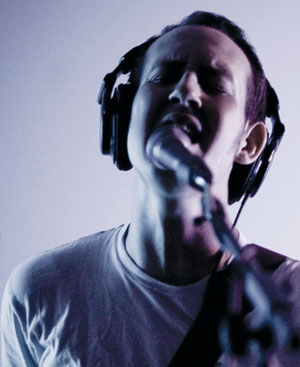

AFTER MORE THAN 25 years as a go-to guitarist in the Santa Cruz music scene, it’s safe to say that Bill Walker loves to jam. He’s hit the highest highs of collaborating with other musicians, since way back when he and his brother Rick played in one of that scene’s most famous bands, Tao Chemical.
But there are times when he simply does not want to answer to any rhythm other than his own. That’s when he breaks out a looper and builds one. He can beatbox on the guitar, then lay down a groove, with the looper recording each new riff and circulating it over and over until he’s got his own sonic foundation he can solo like hell over. It never drops the beat, and it always shows up for practice.
“The looper doesn’t lie,” says Bill Walker of its rhythmic precision. “The looper doesn’t lag. It doesn’t speed up because it has a personality disorder. You’re not at the whim of someone’s drug intake.”
He’s still collaborating with his brother, this time on the Y2KX+1 International Live Looping Festival that they’ll bring back to the Anno Domini Gallery in San Jose on Wednesday, Oct. 12, before it continues Oct. 14Ð16 at Pearl Alley Studios in Santa Cruz. Rick Walker has been one of the looping movement’s prophets, and when he founded the festival back in 2000 (first calling it the Bass Live Looping Festival), he really was a voice in the wilderness. Since then, looping has come into its own. It’s been second nature in electronic music for some time, but artists like Andrew Bird, Owen Pallett (who used to call himself Final Fantasy) and KT Tunstall have more recently upped its visibility in the indie world. And perhaps nothing has done as much to bring the concept of looping into the mainstream as the now-famous clip of Imogen Heap using it to perform “Just For Now” that’s been viewed by millions on YouTube.
The technology is now used by musicians around the world, many of whom post on Looper’s Delight, the pioneering website founded in 1996 that has in many ways provided a record of looping’s growth as an art form.
Rick and Bill Walker are both key figures in the Looper’s Delight community, and in 2006 they organized and performed at a 10th-anniversary event for the site as part of the Y2K6 festival. As looping has grown, so has the festival. Rick began traveling to Europe, Japan and Mexico in 2003 to spread the looping gospel, and some 75 similar festivals have subsequently popped up in 20 countries. Walker’s festival in particular is now franchised in Florence and Rome, with plans for new ones in Germany, Singapore, Bali and Thailand in the next two years.
Of course, a bigger pool of loopers means the festival here has to work even harder to stay ahead of the curve. The Anno Domini show on Wednesday will feature an impressive list of globe-trotting artists who feature looping prominently in their work: Sweden’s Per Boysen, Denmark’s Lass Thorning, Georgina Brett from the UK, Canadian Jean-Paul De Roover, Turkey’s Semih Yanyali, Japan’s Mandoman, Nat Grant of Australia and Roberto Zorzi from Italy.
Looping technology has also grown, thanks to Robert Amstadt’s San Jose company Looperlative, among others. Most loopers think of the device (usually a pedal or small component) as a tool, and there seems to be two distinct styles of using it that have evolved over the last decade. One is to play the looping pedal like an instrument itself, but it’s more commonly used to “layer up”—play one part after the other into the looper until the sound is as multi-layered as the musician wants to be. This of course can be done easily in a recording studio, but “live looping” as practiced at the festival, is when it’s done as the audience watches. Many singer/songwriters now use it to create the fullness of a band sound when they perform solo.
I have seen shows where a solo artist literally runs from instrument to instrument to record different parts; first a drum loop, then a bass loop, then a guitar loop, replicating a backing band performing the song as he begins to sing over it. But many musicians create their loops with a single instrument of choice. Steve Uccello, who’ll perform at this year’s festival, is a NorCal bassist who can use looping to create an orchestra’s worth of bass sounds when he plays solo. He says despite the technological angle, the secret of looping has little to do with science.
“It’s a pretty amazing art, really,” he says. Even the smallest choices have a huge impact on the final result. “If the loop is too short, it might get boring really fast. If it’s too long, you’re asking your audience to wait for the good part.”
Bill Walker says over the years of the festival he’s seen appreciation for the technology grow and the notion that “machines ain’t music,” as Mojo Nixon once put it, fading. But no matter how many times he explains it, there are also some people who can’t quite wrap their heads around the concept.
“I have people come up to me all the time and ask ‘Do you have a CD going that you’re playing to?'” he says. “And I have to explain that I’m making it all up on the spot.”
Y2KX+1 LIVE LOOPING FESTIVAL
Wednesday, Oct. 12, at 7:30pm, $5.


